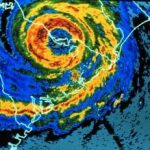Cineálacha Stoirmeacha (Kinds of Storms): An Scéal Leantach (The Sequel) Posted by róislín on Oct 21, 2012 in Irish Language
(le Róislín)
Kind of has a nice beat, doesn’t it? Cineálacha Stoirmeacha [KIN-yawl-ukh-uh STIRzh-im-ukh-uh]. Storms are possible any time of year, of course, but the month of October can see several types. Stoirmeacha sneachta, mar a bhí ar chósta thiar na Stát Aontaithe i mí Dheireadh Fómhair (go luath don séasúr!) sa bhliain 2011 — unseasonably early, we might say. Agus go minic go leor, hairicíní.
In a previous blog, we discussed the origin of the English word “hurricane,” from which we get “hairicín” in Irish. There are at least two schools of thought on the origin of the word “hurricane.” One is that it is adapted from the Carib for “God of Evil” and the other is that it is from the name of a Mayan storm god, Hurakan. Either way, it was “huracán” in Spanish before it reached either English or Irish. https://blogs.transparent.com/irish/cinealacha-stoirmeacha-kinds-of-storms/
You might also remember some vocabulary for different types of storms. Here’s a list of storm-related words, with some practice sentences or Q & A to go along with them.
1. hairicín (an hairicín) [un HARzh-ik-yeen]: hurricane
Cén t-ainm atá ar an hairicín seo? ____________ atá air. OR, another way to ask the same question: Cad is ainm don hairicín seo? ______________ is ainm dó.
2. stoirm (an stoirm) [un STIRzh-im]: storm
An ndearna an stoirm mórán damáiste? Rinne (yes/did) / Ní dhearna (no/didn’t)
3. stoirm mhór (an stoirm mhór) [… wor]: big storm
An mbeidh stoirm mhór ann anocht? Beidh, cinnte.
4. spéirling (an spéirling): thunderstorm
Ciallaíonn “spéirling” “thunderstorm” ach níl an focal “toirneach” (thunder) ann.
5. stoirm thoirní (an stoirm thoirní) [… HIRzh-nee]: thunderstorm
An bhfaca tú an t-athrú don fhocal “toirneach” (thunder)? Chonaic, tá sé séimhithe (“th” in ionad “t”) agus tá sé sa tuiseal ginideach (“-í” in ionad “-each”).
6. stoirm ghaoithe (an stoirm ghaoithe): wind storm
Cé chomh láidir is atá an ghaoth sa stoirm ghaoithe seo? Níl mé cinnte, ach is gaoth fórsa gála í.
7. síon (an tsíon) [SHEE-un]: weather, usually implying stormy
Cad é atá níos measa ná an tsíon í féin? Lá na seacht síon (lit. the day of the seven stormy “weathers,” i.e. a very stormy day)
8. anfa gaoithe (an t-anfa gaoithe): wind storm
Cad é an difear idir “stoirm ghaoithe” agus “anfa gaoithe”? Níl a fhios agam ach tá séimhiú ar an bhfocal “ghaoithe” tar éis an fhocail “stoirm” (baininscneach) agus níl séimhiú ar an bhfocal “gaoithe” tar éis an fhocail “anfa” (firinscneach). “Is gramadóir mé, Jim, ní meitéareolaí mé,” le parafrása a chur ar mhéim Dr. McCoy.
9. saighneán gaoithe (an saighneán gaoithe): sudden blast of wind
Ar mhothaigh tú an saighneán gaoithe sin? Mhothaigh, agus d’fhág sé préachta leis an bhfuacht mé (it left me chilled to the bone).
10. gála (an gála): gale
Bhí sé ina ghála aréir (It was blowing a gale last night).
11. tíofún (an tíofún): typhoon
Bíonn tíofúin ar an Aigéan Ciúin agus bíonn hairicíní ar an Aigéan Atlantach.
And there’s always the useful prefix “droch-” (bad), which can be used for “drochaimsir” (bad weather), “drochstoirm” (a bad storm), or “drochoíche” (a bad night). That is if you’re not referring to the infamous Irish “oíche na gaoithe móire” (night of the big wind).
SGF, Róislín
Freagra: Hugo
Grianghraf: National Oceanic and Atmospheric Administration (NOAA), public domain

Build vocabulary, practice pronunciation, and more with Transparent Language Online. Available anytime, anywhere, on any device.





Leave a comment: